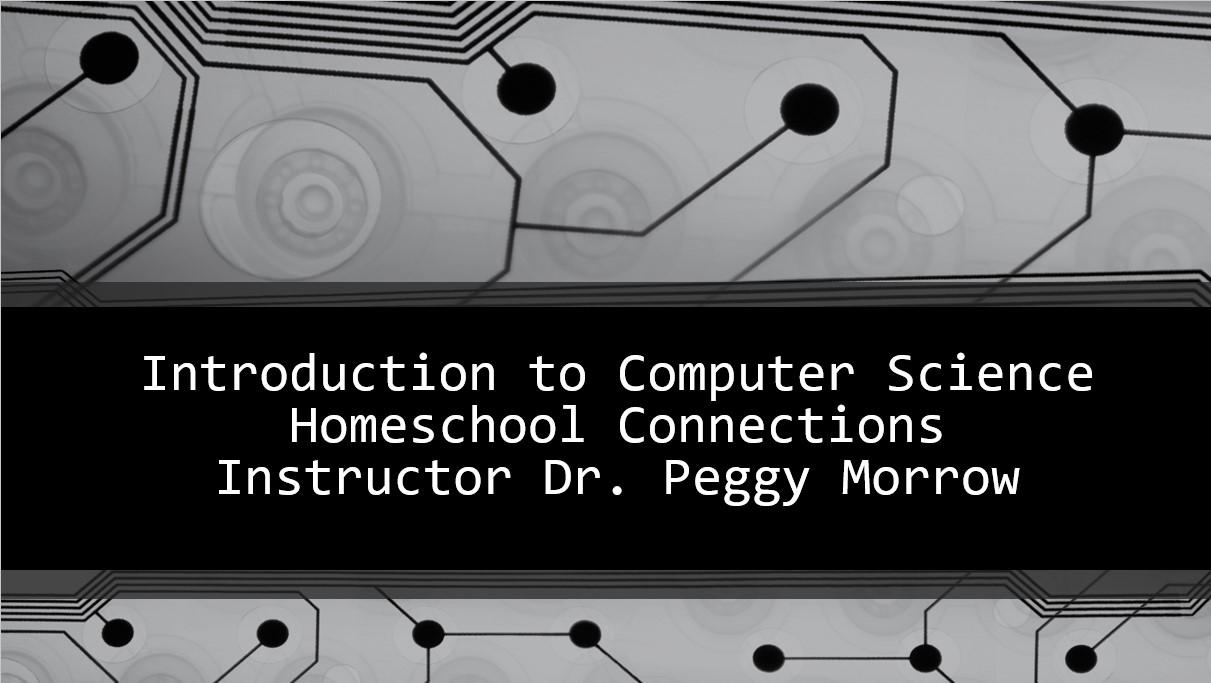
Dear Student,
This course is scheduled to be retired on Aug 30, 2024. You may continue using this course; however, we highly suggest moving to the new, updated course.
https://moodle.homeschoolconnectionsonline.com/course/view.php?id=4088
The OPTIONAL Instructor Access Grading Service is available for this course!
Broaden your understanding of computer science for practical use in a variety of college and university majors and professional careers. All middle and high school students are welcome! Part 1 of 2.
How to get the most out of Introduction to Computer Science, Part One with Margaret Morrow, Ph.D.:
-
First, read the course materials below before the first class meeting.
-
Then have a notebook ready and available for class notes each live session.
-
Read assignments before class meetings
-
Watch that week’s recording if you need to revisit information from our live session.
-
Do the assignments, quizzes, and any extra work assigned for that week.
-
Once the course is completed to the parent's and professor’s satisfaction, there is a Certificate of Completion at the end to be filled in for your records.
Special Notes: This is Part One of a 2-Part course. Students are expected to sign up for Part Two in the spring.
This course meets twice per week for 13 weeks.
Total Classes: 26
Duration: 30 minutes
Prerequisite: The ability to acquire the required software/applications (see Course Materials section). Students should have a general familiarity with computers – the ability to open applications, use menu-driven commands, and type using the keyboard – so that the emphasis of time can be placed on specific programming lessons.
Suggested Grade Level: 7th to 12th grade
Suggested Credit: One full semester Computer Science
Instructor: Margaret Morrow, Ph.D.
Course Description: This is part one of an entry-level course, which is designed to expose students to what computer scientists do daily. Students will build games (both 2D and 3d), illustrate stories, and create art, animations, and music during their exploration. The tools we will use have similar properties to building block toys used by children to construct model sized homes, stores, and towns. Students will learn about computing careers, the history of computer science, hardware and software design, and discovering ways for technology to serve people and communities. By the end of the class, students will be able to discern whether further studies in this field are their forte.
Course outline (week by week):
-
Week 1: Introduction to Computer Science
-
Week 2: Algorithmic Discovery and Design
-
Week 3: Algorithmic Efficiency and Robotics
-
Week 4: Building Blocks: Binary, Boolean, Logic, and Gates
-
Week 5: Computer System Organization
-
Week 6: Computer Operating Systems
-
Week 7: Computer Networks and Cloud Computing
-
Week 8: Information Security, Cyber Security, and Cyber Warfare
-
Week 9: The Tower of Babel – The Proliferation of Programming Languages
-
Week 10: Program Language Machine Translation
-
Week 11: Models of Computation, Simulation and Modeling
-
Week 12: Artificial Intelligence and Deep Learning
-
Week 13: Databases and Personal Privacy, Social Computing
Course Materials: All materials for the course (ebooks, assignments, lessons, and software) are available for FREE on the web and were developed specifically to help learners of computer science. You can access these tools as follows: Scratch (web based) or Scratch Download (offline); Blender (offline only); Open Processing (web based) or Processing (offline); and Alice (offline only windows, mac, linux) . Some book recommendations will be made available, but are not required for purchase.
Homework: Assignments will have a Catholic theme to them such as create a video adventure game that illustrates a story from the Old Testament, create a quiz game that prepares someone studying for confirmation, research computer science projects at a Catholic University and report what you find, investigate how your Diocese/Church/Priest uses technology tools, completing programming exercises, and online quizzes which provide immediate scoring feedback. In this course, students have an option to share their programs with fellow students via a short in-class demonstration, or by uploading them to the tool’s website. All assignments are given and graded by the instructor. Students will also collaborate with fellow students and mentor them when needed so as to reinforce their knowledge by helping others. Students can expect 2 to 5 hours of time per week (outside of class time) dedicated to homework. Regular feedback will be provided to the students and their parents to ensure that all are aware of the progress being made throughout the course.
- Teacher: Dan Goddu
- Teacher: Peggy Morrow
- Teacher: Maxwell Wallenberg